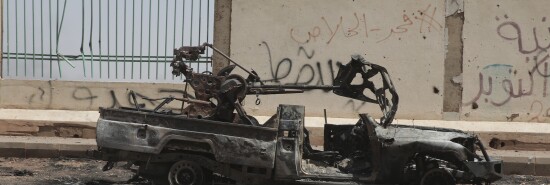
Will Sudan’s conflict descend into a proxy war?
Daniel DePetris
The African nation of Sudan is no stranger to conflict. Since Sudan declared independence from the U.K. and Egypt in 1956, there have been too many insurgencies and civil conflicts to count. One of the deadliest ended in 2005, when Khartoum signed a deal with Sudan’s People Liberation Movement/Army to grant the South Sudanese the ability to secede and create their own state. The war in Darfur in the early 2000s claimed hundreds of thousands of lives and turned former Sudanese dictator Omar Hassan al Bashir into an international outcast.
Sudan’s latest clash, however, isn’t another traditional case of the center fighting with the periphery, but rather the center fighting with itself. Sudan’s army chief and de facto leader, Gen. Abdel Fattah al Burhan, and the head of the Rapid Support Forces (RSF), Gen. Mohamed Hamdan Dagalo (known as Hemedti), two men who allied to oust the civilian prime minister in 2021, are now struggling against each other for power.
None of us know how the fighting will develop or whether Sudan is on the precipice of another civil war. What we can say, however, is that the vast majority of the international community hopes a civil war can be avoided. World powers, including Russia and the U.S., have called on Burhan and Hemedti to agree to a ceasefire. Multiple attempts at solidifying a truce have already broken down, notwithstanding claims by Sudan’s top two generals that they support such efforts. Over 400 people have been killed in the violence so far, and over 3,500 more have been wounded. Sudanese Air Force planes are now bombing their own capital to destroy RSF bases and positions.
US MILITARY PREPARING POSSIBLE EVACUATION FROM EMBASSY IN SUDAN
The risk for Sudan is that the longer the fighting goes on, the more likely regional powers who have vested interests in the outcome will pick sides, arm their respective proxies, and deepen their involvement. This is already occurring at a low level. Gen. Abdel Fattah el-Sisi, Egypt’s strongman leader, has reportedly sent aircraft and pilots to Burhan to help him snuff out Hemedti’s RSF. Libyan militia leader Khalifa Haftar, who ironically received military support from Egypt in the past, apparently dispatched a planeload of military supplies to Hemedti. Russia’s Wagner Group has handed surface-to-air missiles over to Hemedti’s forces as well.
These are ominous but not necessarily surprising developments. They aren’t surprising because you would expect states to do what they usually do: protect their own economic and political interests. For better or worse, Egypt believes its interests are best achieved by helping Burhan take power by force. Even so, the developments are also disturbing because foreign involvement will make the establishment of a ceasefire between these two stubborn, ruthless men all the more complicated to hammer out.
When a civil war turns into a proxy conflict, it tends to lengthen the fighting to the detriment of civilians, result in more material damage to the country, and muddle the opportunities for a diplomatic way out. And with foreign benefactors pouring resources into their armories, Burhan and Hemedti will have little incentive to even consider a truce, let alone negotiations.
CLICK HERE TO READ MORE FROM THE WASHINGTON EXAMINER
Daniel DePetris (@DanDePetris) is a contributor to the Washington Examiner’s Beltway Confidential blog. His opinions are his own.
